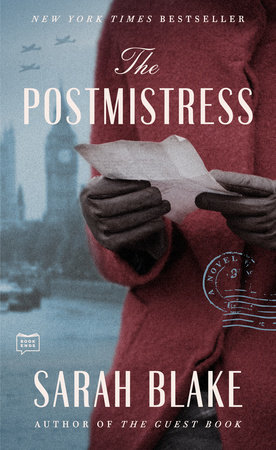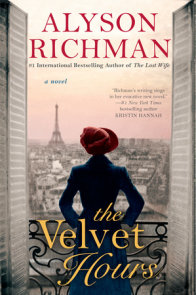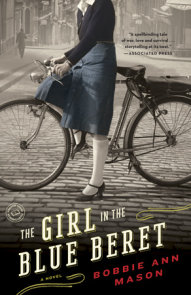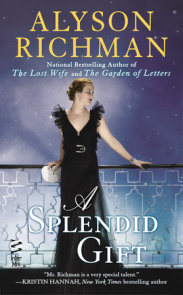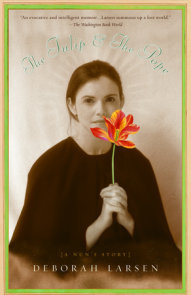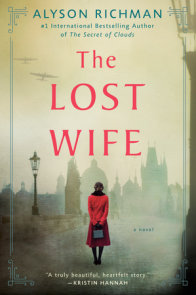READERS GUIDE
Questions and Topics for Discussion
INTRODUCTION
Those who carry the truth sometimes bear a terrible weight…
It is 1940. While war is raging in Europe, in the United States President Roosevelt promises he won’t send American boys over to fight.
Iris James is the postmistress and spinster of Franklin, Massachusetts, a small town on Cape Cod. Iris knows a lot more about the townspeople that she will ever say. She knows that Emma Trask has come to marry the town’s young doctor. She knows that Harry Vale, the town’s mechanic, inspects the ocean from the tower of the town hall, searching in vain for German U-Boats he is certain will come. Iris firmly believes that her job is to deliver and keep people’s secrets, to pass along the news of love and sorrow that letters carry. Yet one day Iris does the unthinkable: she slips a letter into her pocket. And then she does something even worse — she reads the letter, then doesn’t deliver it.
Meanwhile, seemingly fearless American radio gal Frankie Bard is working with Edward R. Murrow, reporting from the Blitz in London. Frankie’s radio dispatches crinkle across the Atlantic, imploring listeners to pay attention to what is going on as the Nazis bomb London nightly. Then, in the last, desperate days of the summer of 1941, Frankie rides the trains out of Germany and reports what is happening. But while most of the townspeople of Franklin are convinced the war “overseas” can’t touch them, Iris and Emma — unable to tear themselves away from Frankie’s voice — know better.
Alternating between an America on the eve of entering into World War II, still safe and snug in its inability to grasp the danger at hand, and a Europe being torn apart by war, the two stories collide in a letter, bringing the war finally home to Franklin.
The Postmistress is a tale of three unforgettable women, of lost innocence, of what happens to love when those we cherish leave us. It examines how we tell each other stories—how we bear the fact that that war is going on at the same time as ordinary lives continue. Filled with stunning parallels to our lives today, it is a remarkable novel.
ABOUT SARAH BLAKE
Sarah Blake lives in Washington, D.C., with her husband, the poet Josh Weiner, and their two sons.
A CONVERSATION WITH SARAH BLAKE
Q. What attracted you to this time period, right before the attack on Pearl Harbor?
I played around with when to set the novel—at one point I had Will drafted and in the Army and lost horribly in the Bataan Death March—but the more research I did on the war I grew more and more interested in this three year period from 1938-1941 when all of Europe was at war, Japan and China were marching to the brink, and we were (officially) neutral. I was interested in the time before it was clear, before it was “the good war,” before the full horror of the Holocaust—the things we know now—was evident. What would that feel like? What would it feel like before our role in history, and in WW2 was a given. Against that I wanted to dramatize Frankie’s growing desperation–echoed in so many reports of the time–her desire for her country to pay attention. It seemed to me to resonate with so much of what was going on here during the years I was writing the book, roughly 2001-2008, when the country seemed not to be paying attention to the fact that we were in fact in a war. Indeed, we were being told by our leadership to look away.
Q. What kind of research did you do for the novel?
I read many books about the war and the time period, and I went through stacks of Life Magazines from 1940-1945. I spent quite a while at The Museum of Radio.
As well as reading Work Project Administration interviews with people who were living on Cape Cod at the time, I interviewed a woman in her nineties who lived in Provincetown (on which the town of Franklin is loosely based) during the war. I interviewed a war journalist, a midwife and also the postmaster of North Haven Maine who told me in no uncertain terms that there was no such thing as a postmistress. (This was after I’d told him the title of my novel) “It’s postmaster,” he rapped out, “ I don’t care whether it’s a man, a woman or a baboon.”
Q. You have a PhD in Victorian Literature. Does that background influence your writing?
Nineteenth century literature is fantastically two-fisted, and I am clearly influenced by the years I spent studying it closely. On the one hand there are the enormous sweeping novels of Dickens, Zola, Balzac where whole worlds—cities and nations– are painstakingly chronicled and set into play; and then, on the other there is the Victorian ghost story which is often a domestic drama where characters are haunted (literally and figuratively) by figments of their own passions and desires—like those found in the Brontes, Wilkie Collins, and Thomas Hardy. I am drawn to the complicated plots and twists and turns of characters’ desires that were a benchmark of Victorian fiction. And in fact, mIy first novel, Grange House, arose out of my desire to try and write a Victorian novel, down to the serpentine sentences, the speech patterns, and the ghost plot.
Q. In The Postmistress, Frankie struggles with how to tell the stories of the people she meets. Is that something you’ve experienced as a writer?
A woman sitting next to me on a plane told me the story of her uncle in Austria under the Nazis, which was more or less the story I gave to Thomas on the train. It is an amazing story of coincidence and escape and it sent shivers down my spine as she told it. The struggle came with how to use it—how to set it so it could shine jewel-like out of the larger frame of the novel; how to make it mean, in other words. On the other hand, when I was interviewing a woman in Provincetown who had lived through the war years there, she told me the story of a German breadwrapper that had washed up on the Back Shore, proof that the German Uboats were out there and not far. For years I tried to use that story in my novel—trying every which way to have a breadwrapper discovered, at one point even staging the running aground of a Uboat on the beach, witnessed by Harry—but in the end, it just didn’t fit, so I had to leave it—perfect story—behind.
Edward R. Murrow, Frankie’s boss, is an important historical figure. Is there a difference between writing about a real person, versus writing about a character you’ve created? In some ways writing about Edward R. Murrow was easier than the other characters because his character, his mode of speaking, his observations are so much a part of the public record. Listening to his broadcasts give us immediate insight into the passion and heart and intellect of a man gifted at translating what he sees and hears into vivid word pictures. I read the transcripts of his broadcasts and was able to imagine how he might speak in conversation, how he might move about in a scene, because of the way in which he wrote. In many ways, he wrote himself.
Q. The Postmistress begins with Frankie at a dinner party years later. Do you have some idea of what happened to Emma and Iris after the events of the novel?
I imagine that the two remain in Franklin, and that Iris becomes a kind of godmother to Emma and her child. I’d like to think that Emma begins to have the experience of having someone watching over her, watching out, the very thing she said she’d never had, and then got so briefly, through Will.
DISCUSSION QUESTIONS







